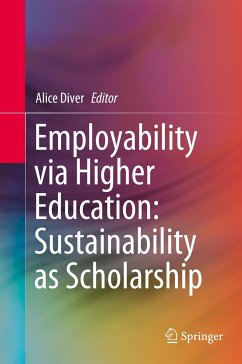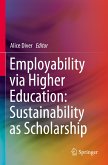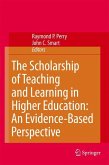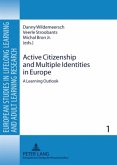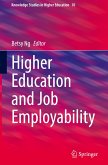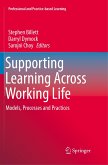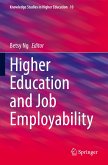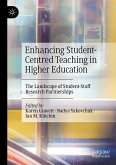Employability via Higher Education: Sustainability as Scholarship
Herausgegeben:Diver, Alice
Employability via Higher Education: Sustainability as Scholarship
Herausgegeben:Diver, Alice
- Gebundenes Buch
- Merkliste
- Auf die Merkliste
- Bewerten Bewerten
- Teilen
- Produkt teilen
- Produkterinnerung
- Produkterinnerung
This book discusses the topic of graduate employability from the premise that in this era of 'massification,' economic austerity, and political uncertainties, higher education (HE) no longer guarantees a clear 'work place advantage.' Divided into three sections, the book offers theoretical and philosophical discourses on the 'HE quandary,' whilst taking into account - and critiquing - political, temporal, and national contexts. It culminates in an investigation into specific discipline areas. It offers insights into the way that institutions, decision-makers, academics, and professional…mehr
Andere Kunden interessierten sich auch für
![Employability via Higher Education: Sustainability as Scholarship Employability via Higher Education: Sustainability as Scholarship]() Employability via Higher Education: Sustainability as Scholarship121,99 €
Employability via Higher Education: Sustainability as Scholarship121,99 €![The Scholarship of Teaching and Learning in Higher Education: An Evidence-Based Perspective The Scholarship of Teaching and Learning in Higher Education: An Evidence-Based Perspective]() The Scholarship of Teaching and Learning in Higher Education: An Evidence-Based Perspective202,99 €
The Scholarship of Teaching and Learning in Higher Education: An Evidence-Based Perspective202,99 €![Active Citizenship and Multiple Identities in Europe Active Citizenship and Multiple Identities in Europe]() Active Citizenship and Multiple Identities in Europe104,20 €
Active Citizenship and Multiple Identities in Europe104,20 €![Higher Education and Job Employability Higher Education and Job Employability]() Higher Education and Job Employability113,99 €
Higher Education and Job Employability113,99 €![Supporting Learning Across Working Life Supporting Learning Across Working Life]() Supporting Learning Across Working Life81,99 €
Supporting Learning Across Working Life81,99 €![Higher Education and Job Employability Higher Education and Job Employability]() Higher Education and Job Employability113,99 €
Higher Education and Job Employability113,99 €![Enhancing Student-Centred Teaching in Higher Education Enhancing Student-Centred Teaching in Higher Education]() Enhancing Student-Centred Teaching in Higher Education113,99 €
Enhancing Student-Centred Teaching in Higher Education113,99 €-
-
-
This book discusses the topic of graduate employability from the premise that in this era of 'massification,' economic austerity, and political uncertainties, higher education (HE) no longer guarantees a clear 'work place advantage.' Divided into three sections, the book offers theoretical and philosophical discourses on the 'HE quandary,' whilst taking into account - and critiquing - political, temporal, and national contexts. It culminates in an investigation into specific discipline areas. It offers insights into the way that institutions, decision-makers, academics, and professional support staff can work together towards ensuring that our graduates are able to cope with the varied demands and challenges of modern job markets. It harnesses arguments and reflections on the breadth and depth of the functions of HE, such as social transformation, promoting principles of social justice, and providing opportunities. It grounds these in a triadic model for enhancing student engagement and holistic learning, namely, the emotional, cognitive, and behavioural aspects. As an anthology, it is forward-gazing in terms of the sustainability debate, whilst still offering evidence-based, research-grounded, practical suggestions to readers looking for tips and tools of the trade.
Produktdetails
- Produktdetails
- Verlag: Springer / Springer International Publishing / Springer, Berlin
- Artikelnr. des Verlages: 978-3-030-26341-6
- 1st edition 2019
- Seitenzahl: 580
- Erscheinungstermin: 8. Oktober 2019
- Englisch
- Abmessung: 241mm x 160mm x 37mm
- Gewicht: 1012g
- ISBN-13: 9783030263416
- ISBN-10: 303026341X
- Artikelnr.: 56999247
- Herstellerkennzeichnung Die Herstellerinformationen sind derzeit nicht verfügbar.
- Verlag: Springer / Springer International Publishing / Springer, Berlin
- Artikelnr. des Verlages: 978-3-030-26341-6
- 1st edition 2019
- Seitenzahl: 580
- Erscheinungstermin: 8. Oktober 2019
- Englisch
- Abmessung: 241mm x 160mm x 37mm
- Gewicht: 1012g
- ISBN-13: 9783030263416
- ISBN-10: 303026341X
- Artikelnr.: 56999247
- Herstellerkennzeichnung Die Herstellerinformationen sind derzeit nicht verfügbar.
Dr Alice Diver is a Senior Lecturer in Law at Liverpool John Moores University, who has worked in HE since 1993. She researches and publishes in the areas of adoption law, human rights, property law, and law in literature. A graduate of Queen's University Belfast (1988), she previously worked as a Solicitor in private practice in Northern Ireland (1991-1995). Her teaching and research supervision areas include property law, family law, indigenous rights, and human rights law. She is the author of a 2013 monograph entitled 'A Law of Blood-ties: The 'Right' to Access Genetic Ancestry' (Springer) which is based upon her PhD (Ulster University, 2012), and co-editor of a collection of essays on the 'Justiciability of Human Rights Law in Domestic Jurisdictions' (Springer, 2015). She has been a trustee for Kinship Care NI since 2014 and a board member of Apex Housing NI since 2013.
Section I - Definitions.- 1. Introduction; Diver.- 2. Higher Education and Civil Society: What Contribution Can Universities Make to Civil Society?; Ceryn Evans, Stuart Fox, Chris Taylor.- 3. Learning Gain: Can It Be Measured?; Peter Gossman, Stephen Powell.- 4. Conceptions of Quality: Some critical reflections on the impact of 'quality' on academic practice; Chris Lawton.- 5. What Motivational Processes Underpin Student Engagement with Employability? A Critical Review ; Andrew James Clements.- 6. Developing Employable, Emotionally Intelligent And Resilient Graduate Citizens Of The Future; Lorraine Dacre Pool, Dawne Gurbutt and Kath Houston.- 7. The Role Of 'Learner Identity' And Experience-Related Beliefs In Developing Desirable Graduate Attributes; Dawne Irving-Bell.- 8. Pushing water uphill? The challenges of non-engagement; Vicki Louise O'Brien, and Francesca Dominique Walker-Martin.- 9. Student Motivation and drop-out rates in Brazil; Dalton Cusciano, Mauro MaiaLaruccia, Luis Fernando Salles Moraes.- 10. Building student resilience for graduate work-readiness; Jacinta Ryan, Sandra Jones, Peter Hayes and Michelle Turner.- 11. "That Working-Class Ethic ... Where There's A Will There's A Way": A Strengths-Based Approach To Developing Employable Scholars; Sarah O'Shea and Janine Delahunty.- Section II - Designs and Difficulties.- 12. Precursors to Employability: How first year undergraduate students plan and strategize to become employable graduates; Emma Mullen; Stephanie Bridges; Sara Eccles; Doris Dippold.- 13. Engaging students, staff, and employers in developing student employability; John Bostock.- 14. Learning from and about each other: developing skills for a connected interdisciplinary world; Dawne Gurbutt.- 15. What happens when politics and career dreams collide? Considering the impact of Brexit on graduate career aspirations; Theresa Thomson.- 16. Assessment strategy: enhancement of student learning through a programme focus?; Ruth Whitfield, Peter Hartley.- 17. Authentic assessment as a tool to bridge the transition between learning and work; Robyn Davidson, Catherine Snelling, Sophie Karanicolas, Tania Crotti, Braden Phillips.- 18. 'Oh, the places you'll go': The importance of relationships on postgraduate research students' experiences of academia; Janine Delahunty and Kathryn Harden-Thew.- 19. Making Student Internships Work: Navigating Stakeholder Interests and Aspirations at the University-Work Interface; Martha Caddell & Rosemarie McIlwhan.- 20. Curiosity and Self-Connected Learning: Re-centring the 'I' in technologically assisted learning; Sally Goldspink and Hilary Engward.- 21. Student Engagement with LinkedIn to Enhance Employability; Emmanuel Mogaji.- 22. Pre-professional identity formation through connections with alumni and the use of LinkedIn; Julie Fowlie and Clare Forder.- Section III - Disciplines.- 23. Developing The 'Oven-Ready' Postgraduate: Squeezing A Quart Into A PintPot To Meet The Employability Agenda; Gillian Forster and Andrew Robson.- 24. Constructing Careers: Self-Awareness, Self-Reflection, And Self-Efficacy Amongst Undergraduate Business Students; Deborah A. Lock.- 25. Hitting the Ground Running: Group Simulations within Business School Cohorts; David M Brown, Ian Charity and Andrew Robson.- 26. Pop-up shops in the curriculum: increasing employability (and contributing to civil society) in times of austerity; Inge Hill and Tina Bass.- 27. Professional Development within second year computing degree programmes; Janice Whatley.- 28. 'Using the Living CV to help students take ownership of their learning gain'; Lisa Dibben and Dawn Morley.- 29. Using an e-portfolio to demonstrate graduate-ness and employability during post-graduate distance education; C.J. van Staden.- 30. Online Education and Distance Learning: A socio-constructivist approach; Kelli Bippert.- 31. Building Career Readiness for Criminal Law Practice: The Adelaide Law School Experience; Kellie Toole.- 32. Leading the way: A case study of establishing an employability scheme at Coventry Law School; Harriet Lodge and Susie Elliott.- 33. Increasing Employability beyond Getting a Job: Engaging Criminal Justice Students in their own Professional Development; Ester Ragonese and Steven Altham.- 34. Quiet Silencing: Restricting the Criminological Imagination in the Neoliberal University; Alana Barton, Howard Davis, and David Scott.- 35. Conclusion.
Section I - Definitions.- 1. Introduction; Diver.- 2. Higher Education and Civil Society: What Contribution Can Universities Make to Civil Society?; Ceryn Evans, Stuart Fox, Chris Taylor.- 3. Learning Gain: Can It Be Measured?; Peter Gossman, Stephen Powell.- 4. Conceptions of Quality: Some critical reflections on the impact of 'quality' on academic practice; Chris Lawton.- 5. What Motivational Processes Underpin Student Engagement with Employability? A Critical Review ; Andrew James Clements.- 6. Developing Employable, Emotionally Intelligent And Resilient Graduate Citizens Of The Future; Lorraine Dacre Pool, Dawne Gurbutt and Kath Houston.- 7. The Role Of 'Learner Identity' And Experience-Related Beliefs In Developing Desirable Graduate Attributes; Dawne Irving-Bell.- 8. Pushing water uphill? The challenges of non-engagement; Vicki Louise O'Brien, and Francesca Dominique Walker-Martin.- 9. Student Motivation and drop-out rates in Brazil; Dalton Cusciano, Mauro MaiaLaruccia, Luis Fernando Salles Moraes.- 10. Building student resilience for graduate work-readiness; Jacinta Ryan, Sandra Jones, Peter Hayes and Michelle Turner.- 11. "That Working-Class Ethic ... Where There's A Will There's A Way": A Strengths-Based Approach To Developing Employable Scholars; Sarah O'Shea and Janine Delahunty.- Section II - Designs and Difficulties.- 12. Precursors to Employability: How first year undergraduate students plan and strategize to become employable graduates; Emma Mullen; Stephanie Bridges; Sara Eccles; Doris Dippold.- 13. Engaging students, staff, and employers in developing student employability; John Bostock.- 14. Learning from and about each other: developing skills for a connected interdisciplinary world; Dawne Gurbutt.- 15. What happens when politics and career dreams collide? Considering the impact of Brexit on graduate career aspirations; Theresa Thomson.- 16. Assessment strategy: enhancement of student learning through a programme focus?; Ruth Whitfield, Peter Hartley.- 17. Authentic assessment as a tool to bridge the transition between learning and work; Robyn Davidson, Catherine Snelling, Sophie Karanicolas, Tania Crotti, Braden Phillips.- 18. 'Oh, the places you'll go': The importance of relationships on postgraduate research students' experiences of academia; Janine Delahunty and Kathryn Harden-Thew.- 19. Making Student Internships Work: Navigating Stakeholder Interests and Aspirations at the University-Work Interface; Martha Caddell & Rosemarie McIlwhan.- 20. Curiosity and Self-Connected Learning: Re-centring the 'I' in technologically assisted learning; Sally Goldspink and Hilary Engward.- 21. Student Engagement with LinkedIn to Enhance Employability; Emmanuel Mogaji.- 22. Pre-professional identity formation through connections with alumni and the use of LinkedIn; Julie Fowlie and Clare Forder.- Section III - Disciplines.- 23. Developing The 'Oven-Ready' Postgraduate: Squeezing A Quart Into A PintPot To Meet The Employability Agenda; Gillian Forster and Andrew Robson.- 24. Constructing Careers: Self-Awareness, Self-Reflection, And Self-Efficacy Amongst Undergraduate Business Students; Deborah A. Lock.- 25. Hitting the Ground Running: Group Simulations within Business School Cohorts; David M Brown, Ian Charity and Andrew Robson.- 26. Pop-up shops in the curriculum: increasing employability (and contributing to civil society) in times of austerity; Inge Hill and Tina Bass.- 27. Professional Development within second year computing degree programmes; Janice Whatley.- 28. 'Using the Living CV to help students take ownership of their learning gain'; Lisa Dibben and Dawn Morley.- 29. Using an e-portfolio to demonstrate graduate-ness and employability during post-graduate distance education; C.J. van Staden.- 30. Online Education and Distance Learning: A socio-constructivist approach; Kelli Bippert.- 31. Building Career Readiness for Criminal Law Practice: The Adelaide Law School Experience; Kellie Toole.- 32. Leading the way: A case study of establishing an employability scheme at Coventry Law School; Harriet Lodge and Susie Elliott.- 33. Increasing Employability beyond Getting a Job: Engaging Criminal Justice Students in their own Professional Development; Ester Ragonese and Steven Altham.- 34. Quiet Silencing: Restricting the Criminological Imagination in the Neoliberal University; Alana Barton, Howard Davis, and David Scott.- 35. Conclusion.

